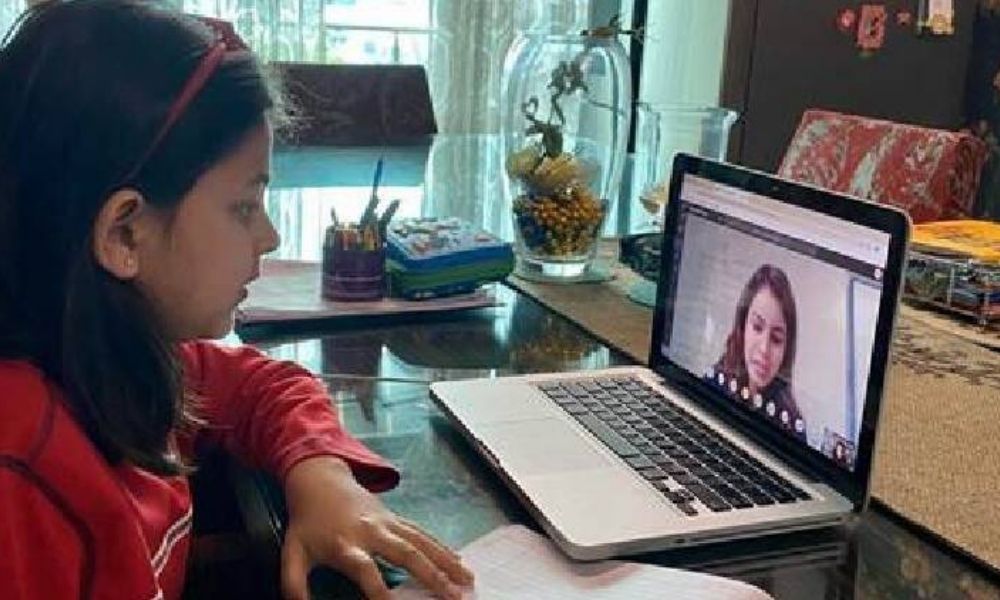
Image Credits: The Indian Express
Is Remote Learning A Boon Or Bane For Students' Mental Health?
India, 12 Aug 2021 1:35 PM GMT
Editor : Ankita Singh |
A literature lover who likes delving deeper into a wide range of societal issues and expresses her opinions about the same. Keeps looking for best-read recommendations while enjoying her coffee and tea.
Creatives : Tashafi Nazir
For most people, journalism sounds hectic and chaotic. For her, it's a passion she has been chasing for years. With an extensive media background, Tashafi believes in putting efforts on presenting a simple incident in the most interesting way.
Various studies suggest that schools providing quality online classes along with the co-curricular activities have noted better mental health among its students. In contrast, education has become monotonous for other students who do not indulge in such activities and has resulted in anxiety and hyperactivity among them.
With the Covid-19 pandemic forcing many countries to shut down educational institutions, the crisis has now overtly affected the overall mental health of the students across countries, including India.
Several studies suggest that schools providing quality online classes along with co-curricular activities have noted better mental health among their students. In addition, consistent peer-to-peer interaction has also helped the students psychologically.
In contrast, education has become monotonous for other students who do not indulge in such activities and has resulted in anxiety and hyperactivity among them.
India accounts for one of the largest student population of 315 million and nearly half of them are girls. The Covid-19 lockdowns and curfews have led to the closure of all schools in India, which eventually affected the students physically and mentally.
According to UNICEF, over 1.5 million schools were closed due to the pandemic across India that directly impacted the students and teachers. The strict lockdown measures compelled the schools to shut down and therefore the mushrooming of online classes abruptly came into effect when the students were neither trained nor prepared for it. The most affected students belonged to the poorest section of the Indian socio-economic hierarchy, where the parents depend on daily wages for survival.
Children From Poor Families Continue To Be Worst Sufferers
According to the Human Development Report 2019, India consists of about 364 million poor people. Children from this section have faced the maximum brunt of accessing education online, from weak signals that make it frustrating to them or erratic power supply.
The government figures say that only 47 per cent of households in India have access to 12 hours of electric power supply while only 8 per cent of the homes with adolescents have internet access. To top it, most of these impoverished children lack psychological counsellors. Anxiety, suicide, depression, dropouts, conflicts and behavioural patterns have further intensified during the pandemic.
The abrupt lockdown policy not only shocked the daily wage workers but also activated enormous mental pressure on their school-going children. Sorrowfully, some students have ended up dying by suicide to escape the mental torture inflicted through the insensitive policy.
Mental Health And Pandemic
For example, last year, a teenage girl student belonging to the poor Dalit community set herself ablaze in Kerala after her father was unable to buy her a smartphone to access online classes. Similarly, a 16-year-old girl student from West Bengal State hanged herself to death due to lack of a smartphone. In July 2020, another student from Tamil Nadu, unable to pay her fees, died by suicide. Due to the instant lockdown, her father had lost the job and didn't have any savings.
"Society for children has remained limited now. There was positive growth as different children from various backgrounds used to mix with each other. The consistent sitting at home has brought behavioural patterns," said educationist G.M.Malik.
"The mental development is shaped when children socialise. The limitation of social health can negatively impact childrens' mental well-being," Dr Zaid Ahmad Wani, Child Psychiatrist at the Institute of Mental Health and Neurosciences J&K said.
Although the government had approved to have counsellors in all schools, the policy has not been enforced as it should have been. Critiques, therefore, argue that India must hire 1.5 million professional counsellors at the earliest to maintain the globally acceptable level of student-to-counsellor ratio in schools.
Positive Aspects Of Online Learning
Virtual education being challenging on one side, some studies, however, see online learning as a future alternative and have many positive sides than classroom education. One such research suggested that despite lower satisfaction with virtual classes, the learning outcomes were similar.
According to it, being able to study remotely provides students with options of choosing an environment according to their own personality. For those with shy and timid personalities, classmates' chatter can be bothersome for such kids, who need a quiet atmosphere while attending lectures. Also, the students who experience bullying every now and then, home has proven to be a refuge during the pandemic times. Staying away from bullies can provide them peace of mind without being fearful.
Kids with shy nature feel free to ask questions to their teachers via online classes, who otherwise feared classmates making fun of them. Such students gain more confidence in asking questions because there is no one to ridicule them.
Moreover, parents are the pillar of support and encouragement for most of the children. Such kids get advantages by being in a safe and familiar environment and are able to get the morale boost from their family members. The thought of moving away from the family can be disheartening for many students, studies suggest. Knowing that they can turn to someone anytime they want can put learners' minds at ease while they study.
While several reports highlight the negative implications of virtual learnings on a child's mental health, some studies also support online learning claiming different individuals respond to situations contrastingly.
Also Read: India's Cleanest City Adds Another Feather To Its Cap; Becomes Country's First 'Water Plus' City
 All section
All section














